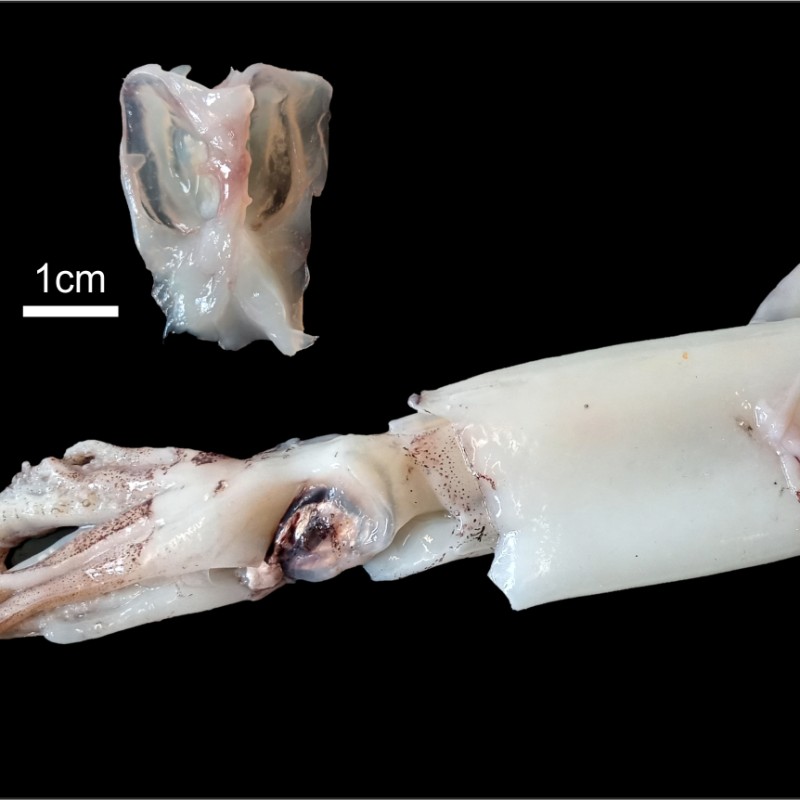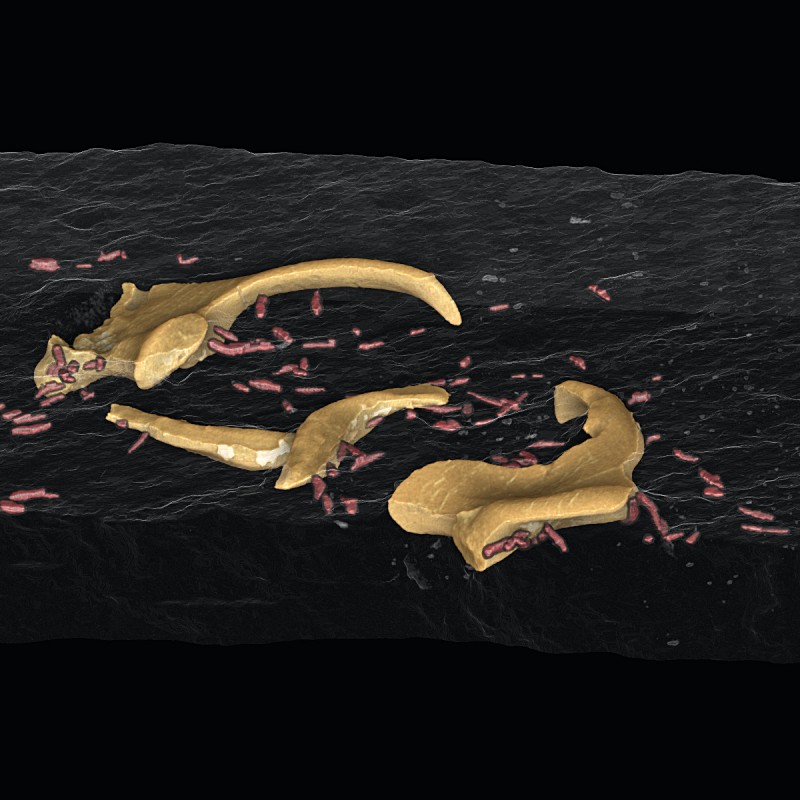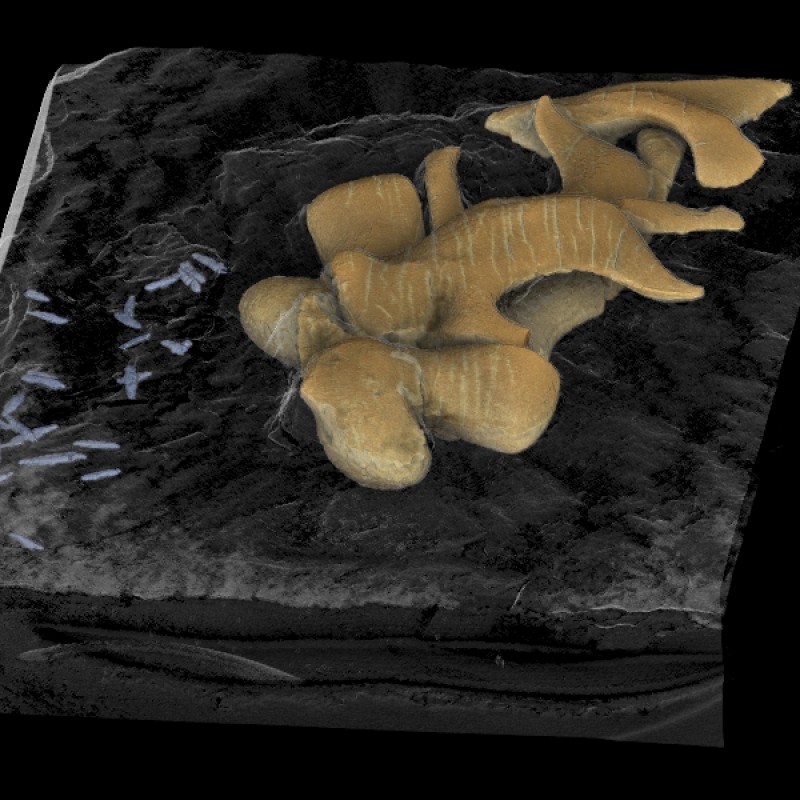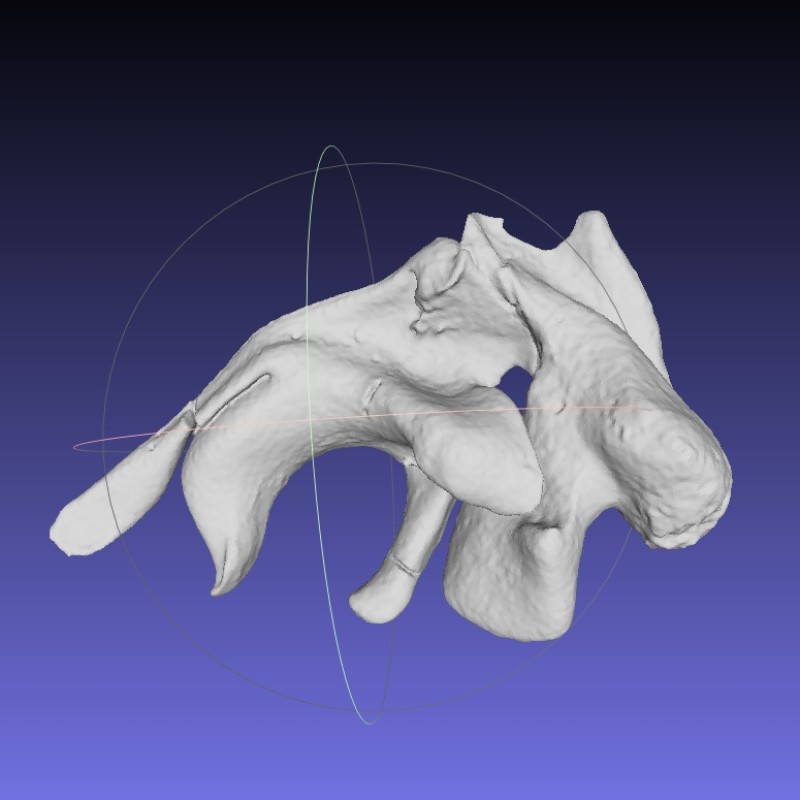New research results: discovery of world's first fossilised squid cartilage
21. April 2022
A team of researchers from the Natural History Museum (NHM) Vienna and the University of Vienna has examined more than 10,000
unique fossils from the Alpine Triassic period (approx. 233 million years ago) and discovered previously unknown structures
in the rock. The mystery of these fossil remains has now been solved: they are the world's first evidence of fossilised squid
cartilage. The results were published in the PLOS ONE scientific journal.
A small trench near the Polzberg between Gaming
and Lunz am See (Lower Austria) harbours one of the most important fossil sites in Austria. This is a deposit of world renown
where spectacular fossils from the Mesozoic have been unearthed for more than 150 years. In 2021, during excavations conducted
by the NHM Vienna and also by citizen scientists, previously unknown black structures measuring up to 3 centimetres were found.
The palaeontologist Dr. Petra Lukeneder, MSc of the Vienna Doctoral School of Ecology and Evolution, University of Vienna
and the palaeontologist PD Dr. Alexander Lukeneder of the NHM Vienna and have now used computer tomography to examine over
80 different specimens of these fossils and their enigmatic structures.
The micro-CT images have now enabled the researchers for the first time to see the inside of the structures. The scanner produced image after image of digital 3D models of the fossil remains, which were criss-crossed by a huge number of ramified passages. In addition, the chemical composition was determined by means of studying ultrathin rock sections under a scanning electron microscope and conducting a high-resolution material analysis. In the objects, which consist of pure carbon, hundreds of tentacle hooks were found embedded. Cuttlebones (the calcareous shells of these molluscs) were also found near the black structures.
The researchers compared the three-dimensional digital models with modern animal groups, which enabled them for the first time to unequivocally identify these enigmatic finds as fossilised squid cartilage. Geochemical processes led to a gradual accumulation of carbon in the originally cartilaginous material and resulted in the preservation of these structures which are now blackened and hard.
The finds could be assigned to the cephalopod species Phragmoteuthis bisinuata, which lived 233 million years ago and is an extinct relative of modern squid. Modern-day squid, such as Loligo vulgaris, the common squid, develop very similar cartilage structures in the head area which strengthens and protects the animals’ brain and eye region. In these ocean creatures, the oesophagus runs through the head cartilage and brain directly into the animal's stomach.
Late Triassic squids inhabited marine areas in the ancient Reifling Sea, a side arm of the Tethys Ocean. This phase of Earth's history saw a worldwide crisis involving mass extinction on the planet that lasted for over two million years. This crisis also had an impact on the sediments and deposits on the seafloor, leading to the formation of oxygen-poor areas in the lowermost water masses of the oceanocean. As a result, even the finest details of the fossils were preserved in the hostile mud, making the Polzberg in Lower Austria a unique site.
This research is funded by the province of Lower Austria (Science and Research) and the Austrian Academy of Sciences (Geo/Hydro Sciences) in the context of two projects.
The micro-CT images have now enabled the researchers for the first time to see the inside of the structures. The scanner produced image after image of digital 3D models of the fossil remains, which were criss-crossed by a huge number of ramified passages. In addition, the chemical composition was determined by means of studying ultrathin rock sections under a scanning electron microscope and conducting a high-resolution material analysis. In the objects, which consist of pure carbon, hundreds of tentacle hooks were found embedded. Cuttlebones (the calcareous shells of these molluscs) were also found near the black structures.
The researchers compared the three-dimensional digital models with modern animal groups, which enabled them for the first time to unequivocally identify these enigmatic finds as fossilised squid cartilage. Geochemical processes led to a gradual accumulation of carbon in the originally cartilaginous material and resulted in the preservation of these structures which are now blackened and hard.
The finds could be assigned to the cephalopod species Phragmoteuthis bisinuata, which lived 233 million years ago and is an extinct relative of modern squid. Modern-day squid, such as Loligo vulgaris, the common squid, develop very similar cartilage structures in the head area which strengthens and protects the animals’ brain and eye region. In these ocean creatures, the oesophagus runs through the head cartilage and brain directly into the animal's stomach.
Late Triassic squids inhabited marine areas in the ancient Reifling Sea, a side arm of the Tethys Ocean. This phase of Earth's history saw a worldwide crisis involving mass extinction on the planet that lasted for over two million years. This crisis also had an impact on the sediments and deposits on the seafloor, leading to the formation of oxygen-poor areas in the lowermost water masses of the oceanocean. As a result, even the finest details of the fossils were preserved in the hostile mud, making the Polzberg in Lower Austria a unique site.
This research is funded by the province of Lower Austria (Science and Research) and the Austrian Academy of Sciences (Geo/Hydro Sciences) in the context of two projects.
Publication in the scientific journal PLOS ONE:
Lukeneder, P. & Lukeneder A. 2022. Mineralized coleoid cranial cartilage from the Late Triassic Polzberg Konservat-Lagerstätte (Austria)". PLOS ONE.
Open Access: https://journals.plos.org/plosone/article?id=10.1371/journal.pone.0264595
DOI: https://doi.org/10.1371/journal.pone.0264595





